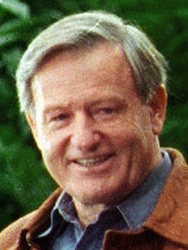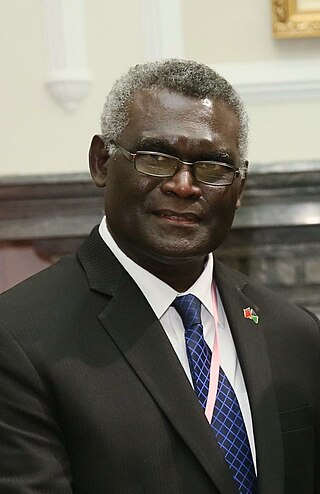This article needs to be updated.(May 2024) |
 |
|---|
The Solomon Islands Liberal Party (SILP) was a political party in the Solomon Islands.
This article needs to be updated.(May 2024) |
 |
|---|
The Solomon Islands Liberal Party (SILP) was a political party in the Solomon Islands.
The party was established as the Nationalist Party in 1975, before becoming the National Democratic Party (NADEPA). [1] Its founders, Joses Tuhanuku and Bartholomew Ulufa'alu, were trade union leaders, with Tuhanuku heading the Solomon Islands General Workers' Union. It won eight of the 38 seats in the 1976 general elections. [2] It was reduced to two seats in the 1980 elections and one seat in the 1984 elections.
In 1986 the party was renamed the Solomon Islands Liberal Party; [3] a split later saw Tuhanuku leave to form the Solomon Islands Labour Party in 1988. In the 1989 elections it won two seats, but lost both in the 1993 elections. It won four seats in the 1997 elections, in which it was part of the Solomon Islands Alliance for Change. The alliance parties won a narrow majority in Parliament and Ulufa'alu became Prime Minister. The alliance lost power as a result of the 2001 elections, which saw it win only 12 of the 50 seats, of which the SILP took two.
The party won two seats in the 2006 elections, and one in the 2010 elections, with Prime Minister Derek Sikua being its sole successful candidate in North East Guadalcanal. It did not contest the 2014 elections.

Politics of Solomon Islands takes place within the framework of a parliamentary representative democratic, constitutional monarchy. Solomon Islands is an independent Commonwealth realm, where executive power is exercised by the government. Legislative power is vested in both the government and a multi-party parliament.

The 1983 United Kingdom general election was held on Thursday 9 June 1983. It gave the Conservative Party under the leadership of Margaret Thatcher the most decisive election victory since that of the Labour Party in 1945, with a majority of 144 seats and the first of two consecutive landslide victories.

The 2000 Canadian federal election was held on November 27, 2000, to elect members to the House of Commons of Canada of the 37th Parliament of Canada. Prime Minister Jean Chrétien's Liberal Party won a third majority government.

The 1993 New Zealand general election was held on 6 November 1993 to determine the composition of the 44th New Zealand Parliament. Voters elected 99 members to the House of Representatives, up from 97 members at the 1990 election. The election was held concurrently with an electoral reform referendum to replace the first-past-the-post system, with all members elected from single-member electorates, with mixed-member proportional representation. It saw the governing National Party, led by Jim Bolger, win a second term in office, despite a major swing away from National in both seats and votes, and the carrying of the referendum by 53.9% to 46.1%.
The Solomon Islands Labour Party is a political party in Solomon Islands. The party was founded in 1988 by the Solomon Islands Council of Trade Unions after the leadership of the union split. Joses Tuhanuku went on to lead the Labour Party, while Bartholomew Ulufa'alu led the Solomon Islands Liberal Party. Tuhanuku would be an MP for the party starting in 1989.

The Christian Historical Union was a Protestant Christian democratic political party in the Netherlands. The CHU is one of the predecessors of the Christian Democratic Appeal (CDA), into which it merged in September 1980.

The People's Alliance Party (PAP) is a political party in Solomon Islands.

The Solomon Islands Alliance for Change was a political alliance in Solomon Islands, led by the Solomon Islands Liberal Party, which was headed by Bartholomew Ulufa'alu until his death in May 2007.

Manasseh Damukana Sogavare is a Solomon Islander politician serving as Minister of Finance since 2024. He served as the prime minister of Solomon Islands for a total of nine years from 2000–2001, 2006–2007, 2014–2017, and 2019–2024. Sogavare has served in the National Parliament representing East Choiseul since 1997.

Bartholomew (Bart) Ulufa'alu CMG was the prime minister of Solomon Islands from 27 August 1997 to 30 June 2000.
The Solomon Islands Social Credit Party ("Socreds") was a political party in the Solomon Islands that espoused social credit theories of monetary reform. It opposed foreign interference in the economy of the country.
This is an overview of United Kingdom general election results since 1922. The 1922 election was the first election in the new United Kingdom of Great Britain and Northern Ireland, after the creation of the Irish Free State removed Southern Ireland from the UK.

The politics of Denmark take place within the framework of a parliamentary representative democracy, a constitutional monarchy and a decentralised unitary state in which the monarch of Denmark, King Frederik X, is the head of state. Denmark is a nation state. Danish politics and governance are characterized by a common striving for broad consensus on important issues, within both the political community and society as a whole.
East Honiara is a parliamentary constituency electing one representative to the National Parliament of Solomon Islands. With an electorate of 30,049 in 2006, it is by far the most heavily populated constituency in the country, being the only one to consist in more than 20,000 voters. It is one of three parliamentary constituencies in the country's capital city, Honiara - the other two being Central Honiara and West Honiara.
Aoke/Langalanga, also known as Auki/Langalanga, is a parliamentary constituency electing one representative to the National Parliament of Solomon Islands. It is one of fourteen constituencies in Malaita Province. It is also a relatively new constituency, having been established for the Fifth Parliament in 1993. It had an electorate of 7,365 in 2006.

The Solomon Islands United Party (UP) is a political party in Solomon Islands.
Joses Tuhanuku is a Solomon Islands politician and former trade union leader. He served three terms in Parliament before losing his seat in the 2006 general election.

General elections were held in the Solomon Islands on 6 August 1997. A total of 350 candidates representing nine parties contested the election, the result of which was a victory for the Solomon Islands National Unity and Reconciliation Party (SINURP), which won 21 of the 50 seats. However, Bartholomew Ulufa'alu, leader of the Liberal Party, was elected Prime Minister by Parliament, defeating SINURP leader Solomon Mamaloni.

The Independent Group (IG) is a political faction in the Solomon Islands comprising the independent members of the Solomon Islands Parliament.